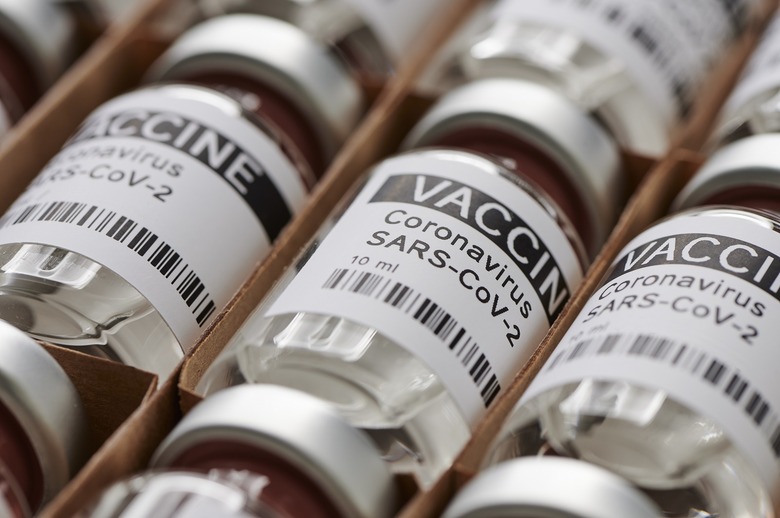Two-Thirds Of Americans Say They Won't Get A Coronavirus Vaccine
- A new poll about coronavirus vaccines shows that two-thirds of Americans aren't willing to get a COVID-19 vaccine.
- A quarter of those interviewed says they won't ever get the vaccine, while 44% of them said they'd rather wait and see how the initial round of immunization goes.
- The recent controversies about vaccine emergency use abroad and in the US might explain why some people might are more reticent than before to these potentially life-saving drugs.
Coronavirus vaccines are one of the hottest COVID-19 topics right now, as several vaccine candidates have entered the critical development stage that will tell researchers whether they're effective against the novel virus and safe for use. Three vaccines have reached Phase 3 in America and Europe, with a few others expected to announce the final stages of research in the coming months. China has at least three vaccines that have reached the final phase, and Russia has an experimental vaccine of its own. The main difference between the east and the west when it comes to vaccine research for the novel coronavirus is that Russia and China have already approved their drugs for emergency use.
That's only part of the reason why the novel coronavirus vaccines are such a hot topic right now. The Trump administration came under fire a few days ago for issuing an emergency use authorization for plasma therapy, and some worried the same might happen with vaccines.
The latest coronavirus vaccine update seems to show how all this vaccine chatter might impact future COVID-19 immunization campaigns. A new poll says that two-thirds of Americans will not get the first COVID-19 vaccines when they're first available, a marked increase from the last survey.
Russia stunned the world by announcing the rollout of its emergency vaccination program before releasing any scientific data that would prove the drug is safe to use and creates the required immune response that would prevent the spread of the illness. China has at least published the papers that describe the efficacy and safety of its advanced drugs.
As for the plasma approval, scientists contested the FDA decision, saying that the available data wasn't strong enough. Plasma transfusions do work in certain conditions and can save the lives of patients experiencing COVID-19 complications. Not all recipients of plasma will fare just as well, however. A report then said that Trump might fast-track the emergency use approval for one of the advanced vaccine candidates before the November 3rd presidential election.
Health experts like Dr. Anthony Fauci have explained that a vaccine would not be approved for public use before the data shows that it works safely on patients, but said that at least a vaccine could be ready by the end of the year and that we might know whether the drugs work by November. FDA commissioner Stephen Hahn made it clear that the political factor will not play a role in vaccine approvals, and that vaccines will be thoroughly vetted before being approved.
All this back-and-forth over vaccine development seems to have impacted the public's opinion. Scientists warned that public trust in this sort of therapy is critical for the success of vaccination campaigns. Previous polls showed that one-third of Americans said they wouldn't get the vaccine when it's available. The new data from the USA Today/Suffolk poll shows a worrying trend.
Two-thirds of the 1,000 voters surveyed last weekend say they won't try to get the vaccine when it becomes available. A quarter of respondents said they'll never get it. The difference between those figures, or 44% of the voters surveyed, will not take the vaccine until others have tried it.
The people who said they would take the vaccine were split between those who said they'll take the drug once it's available (27%) and those who were undecided (6%). People over 75 were the likeliest to say they'll get immunized, but those under 24 also said they would take the vaccine right away or after seeing how the initial immunizations worked.
As many as 86% of Democrats and 61% of Republicans would get the vaccine at some point, while men and women were equally split.
Hispanic voters (17%) and Black voters (15%) are less willing than white voters (31%) to take the vaccine as soon as possible, the poll also showed.
If the government were to mandate the vaccine, 41% of the respondents would not get it, while 50% of them would agree to immunization. In recent remarks, Fauci explained the government would have no way of mandating COVID-19 vaccines, however.
The US government has already inked deals worth billions of dollars with several vaccine makers to ensure access to vaccine supply in case these drugs are effective. Companies are investing money in manufacturing vaccines before they're approved so that the first doses would be available right away after the approval process is complete. Those doses would be worthless if the data won't prove the effectiveness and safety of the medicine. Several people involved in the process, including Dr. Anthony Fauci, Bill Gates, as well as high-ranking execs at pharmaceutical companies, explained in previous interviews that the risk is warranted. If the drugs are effective, vaccination campaigns can start immediately. If they don't work, then only money will be lost.
To induce the kind of vaccine-based herd immunity that will prevent outbreaks from spreading, a country will need to have a high percentage of the population immunized. But this poll indicates that even though the US might be in a position to have access to a large vaccine supply, a significant percentage of the public might not be willing to take advantage of it.
